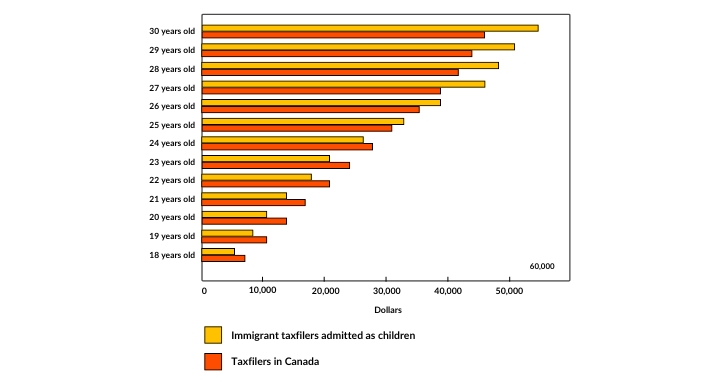A recent study by Statistics Canada shows that immigrant Canadian children have better study & work outcomes. In simpler terms, newcomers who settled in the country as children are more likely to pursue higher education & have better economic outcomes.
In fact, this group of newcomers reported higher salaries than all other Canadian tax filers by the age of 25.
The Earlier, The Better
Looking at the data available through the Longitudinal Immigrant Database, an important data model that tracks long-term data on immigrants who come to Canada – researchers found a positive correlation between how soon a newcomer was admitted to Canada & their likelihood of pursuing post-secondary education.
For instance, among immigrants who settled in Canada at the age of 4, around 77.3% participated in post-secondary education by the age of 20. The finding was consistent with those who settled in Canada between ages 5-9 – 69.9% of whom participated in post-secondary education & those who settled in Canada between ages 10-14, i.e., 61.3% of whom participated in post-secondary education.
By comparison, only 59.9% of all Canadian tax filers participated in post-secondary education by the age of 20. This implies that newcomer cohorts had a significantly elevated rate of participation in post-secondary education, even when compared to all Canadians.
The finding was parallel by the economic outcomes of newcomers based on how young they were admitted to Canada. Specifically, newcomer tax filers who were admitted to Canada reported higher salaries than the average of all Canadian tax filers in their age group.
However, this finding was not immediate but delayed based on the age of average tax filers. For instance, immigrants who were admitted to Canada as children had lower median salaries than all other Canadian tax filers between the ages of 18-24.
However, after the age of 25, the median salaries of this newcomer cohort equaled/ surpassed the median wage of all Canadian tax filers in a similar age bracket.
By the age of 30, newcomers admitted to Canada as children had a median wage that was 17.6% higher than that of all other Canadian tax filers in the same age bracket. These findings are as follows:
What Do These Results Indicate?
Immigrant Canadian children have better study & work outcomes. Results from this study seem to indicate that both participation in higher education & labor market outcomes are positively impacted for newcomers who arrive in Canada at an early age – with an increased effect for those who arrive in Canada earlier. The study further suggests that newcomers who are admitted to Canada earlier have better outcomes than not just those who arrive later in the nation but also the Canadian population in general. The study does not suggest reasons for this phenomenon, with more research required to explain how these results come about.
This data adds to further literature that suggests a positive correlation between the youth of immigrants at the time of admission to Canada and successful economic outcomes in the nation—in the short, medium, and long term.
Moreover, other studies have also suggested that the positive relationship between how soon an immigrant arrives in Canada & their earnings increases with time. This is also reflected in the scoring weightage the CRS offers to age, with younger newcomers seeing an advantage due to their youth.
